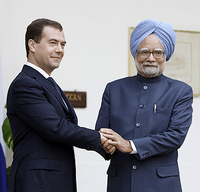The current annual summit between the governments of India and Russia, scheduled to last from Dec. 6-8, testifies to the continuing shared interests between both countries. Russian and Indian policymakers still pursue many common objectives while having few divergent ones. Yet, ongoing improvements in India's relations with Western countries, especially the United States, present challenges to Russian policymakers as they strive to maintain Russia's position as India's most important strategic partner.
A few days before arriving in Moscow, Indian Prime Minister Manmohan Singh gave a lengthy interview with Russian media outlets in which he lavished praise on Russia. Calling their bilateral relationship "an enduring friendship that has stood the test of time," Singh said that the two countries shared common interests, values, and approaches toward many international issues because they were both "large pluralistic democracies undergoing rapid economic transformation." Singh reassured his Russian audience that, despite India's growing ties with new partners, Indians "are . . . clear that our growing engagement with the rest of the world cannot be at the cost of our time-tested ties with Russia."
Even as their strategic partnership persists, however, the underlying nature of the Russian-Indian relationship is changing in ways similar to the Russia-China relationship. In both cases, the importance of economic ties with Moscow has decreased as India and China have opened their borders to Western trade and investment. In addition, the growing capabilities of the two countries' domestic defense industries is confronting Russia with the choice of either offering them better weapons for sale or accepting a long-term decrease in military exports to what had been Moscow's two best national arms markets.

